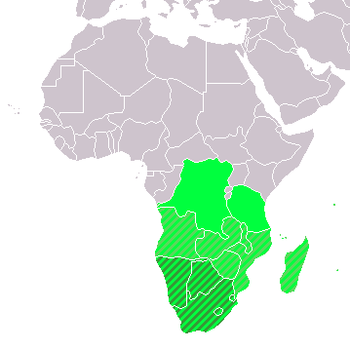
Back Afrika Blah Tunong ACE Suider-Afrika Afrikaans إفريقيا الجنوبية Arabic افريقيا الجنوبيه ARZ África Austral AST Geefa Afrika AVK Cənubi Afrika Azerbaijani Көньяҡ Африка Bashkir Aprikang Habagatan BCL Паўднёвая Афрыка Byelorussian
The article's lead section may need to be rewritten. (May 2022) |


Southern Africa is the southernmost region of Africa. No definition is agreed upon, but some groupings include the United Nations geoscheme, the intergovernmental Southern African Development Community, and the physical geography definition based on the physical characteristics of the land.
Defined by physical geography, Southern Africa is home to a number of river systems; the Zambezi River is the most prominent. The Zambezi flows from the northwest corner of Zambia and western Angola to the Indian Ocean on the coast of Mozambique. Along the way, it flows over Victoria Falls on the border between Zambia and Zimbabwe. Victoria Falls is one of the largest waterfalls in the world and a major tourist attraction for the region.[1]
Southern Africa includes both subtropical and temperate climates, with the Tropic of Capricorn running through the middle of the region, dividing it into its subtropical and temperate halves. Countries commonly included in Southern Africa include Angola, Botswana, the Comoros, Eswatini, Lesotho, Madagascar, Malawi, Mauritius, Mozambique, Namibia, South Africa, Zambia, and Zimbabwe. In cultural geography, the island country of Madagascar is often not included due to its distinct language and cultural heritage.[1]
- ^ a b "Southern Africa".